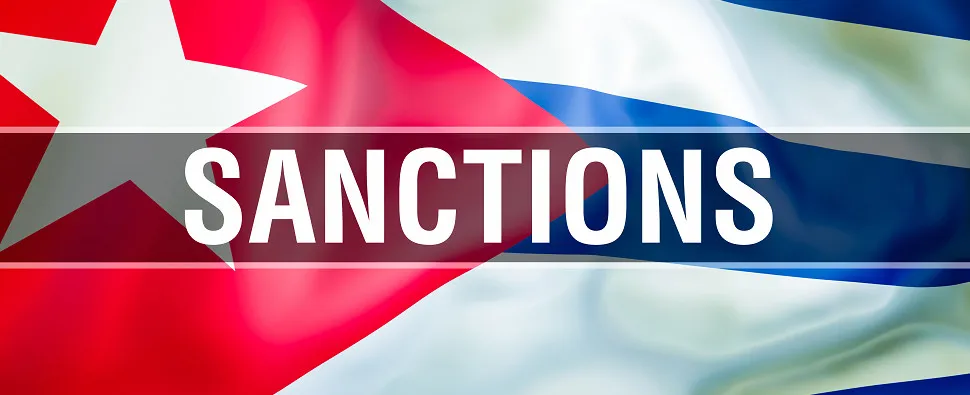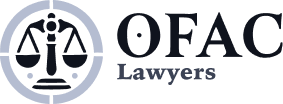
OFAC Cuba Sanctions
The U.S. sanctions against Cuba, implemented by the Office of Foreign Assets Control (OFAC), are among the strictest restriction regimes in the world. They include freezing the assets of Cuban state structures and companies, restrictions on exporting and importing goods and services, business and travel restrictions to Cuba, and strict control over financial transactions between the countries. These sanctions aim to curb terrorism and limit Cuba’s economic opportunities to influence its political course.
For those who need to comply with the sanctions regime or require professional support, OFAC lawyers will help navigate the complexities of the law and minimize the risks of violations.

Understanding Cuban Assets Control Regulations
The Cuban Assets Control Regulations (CACR) are a set of rules developed by the Office of Foreign Assets Control and outlined in the Federal Register to regulate economic relations between the United States and Cuba. They aim to pressure the Cuban government by limiting its access to U.S. financial and commercial resources.
The main aspects of the Cuban Assets Control Regulations (CACR) rules include:
- Asset Freeze: all assets belonging to Cuban companies, government institutions, or individuals are frozen within the United States;
- Financial transaction restrictions: conducting any payments or financial transactions with Cuban entities requires special authorization from the treasury department’s Office of Foreign Assets Control (OFAC);
- Trade restrictions: the export and import of most goods and services between the United States and Cuba are prohibited, except for humanitarian aid or licensed operations.
What are OFAC sanctions on Cuba?
The primary goal of OFAC sanctions Cuba is to weaken the Cuban government’s economic resources to support democratic changes. Despite effort by the Obama administration to mend this decades long rocky relationship between Cuba and the United States, President Trump re-established business and travel restrictions.
Main regulatory and legal acts and documents:
- The Cuban Assets Control Regulations (CACR), established in 1963, are a set of regulations that implement the freezing of Cuban assets in the United States and impose restrictions on financial transactions.
- The Cuban Democracy Act (CDA) of 1992 is a document that prohibits subsidiaries of U.S. companies operating in third countries from doing business with Cuba.
- The Helms-Burton Act of 1996 is a law that extends the application of sanctions to international companies that do business with Cuba and sets strict conditions for lifting those sanctions.
- The Trade Sanctions Reform and Export Enhancement Act (TSRA) of 2000 regulates the export of a limited list of goods to Cuba, such as agricultural products, provided that a license is obtained.
These legal documents form the basis for the implementation of OFAC sanctions against Cuba in the USA.
Penalties for Violating Cuba Sanctions
Violating Cuba sanctions as outlined by the Treasury Department’s Office of Foreign Assets Control (OFAC) can lead to significant financial and legal consequences.
For example, a foreign company was fined millions for conducting financial transactions through American banks, which violated sanctions rules. This incident highlights the seriousness of OFAC’s control, which covers not only American organizations but also international entities dealing with dollar transactions.
Failing to comply with sanction restrictions can lead to significant reputational risks and financial losses for any company.
Financial and Civil Penalties
The Cuba sanctions by the Office of Foreign Assets Control entail severe financial penalties for both legal entities and individuals. In cases of violation sanctions programs possible imposition of administrative and criminal fines. Administrative penalties can reach up to $250,000 or twice the value of the prohibited transaction. Criminal penalties are even more severe – fines of up to $1 million and imprisonment for up to 20 years.
Civil liability includes freezing of assets belonging to individuals or organizations that violate sanctions. This means the State Department can block access to financial resources indefinitely. Additionally, individuals or companies affected by such violations have the right to file civil lawsuits, which can lead to further financial losses for the violators.
Thanks to a combination of financial penalties, asset freezes, and the possibility of legal action, these measures significantly complicate any attempts to circumvent established restrictions.
OFAC Licenses for Travel to Cuba
For travel to Cuba under the OFAC sanctions regime, two types of licenses are provided: general and specific.
A general license allows for travel without the need to submit a separate application to the Treasury Department’s Office of Foreign Assets Control, but only for specific categories, such as educational programs, humanitarian missions, or family visits. These trips must meet specific criteria clearly outlined in the United States and Cuba sanctions regulations.

An individual license requires prior authorization from the Office of Foreign Assets Control for travel that does not fall under the conditions of a general license. In such cases, a justification for the visit must be provided, which must comply with sanction exceptions.
This approach ensures strict control over travel, preventing unauthorized movements of individuals between the US and Cuba.
General Licenses
A general license is permission automatically granted by the Treasury Department’s Office of Foreign Assets Control for conducting certain types of activities, usually prohibited by Cuban sanctions. This type of license does not require submitting to an individual application or obtaining special permission, but it does require strict compliance with established conditions.
Even with a general license in place, some actions may require additional confirmation from OFAC or meticulous documentation of the transactions carried out. This is necessary to ensure that activities comply with established rules and to avoid potential sanctions.
General licenses apply to 12 categories of activities:
- Family visits are trips to see relatives in Cuba.
- Official government affairs are the activities of representatives of the US government or foreign governments.
- Journalistic activity is the professional work of journalists and media representatives.
- Professional research and meetings involve participating in conferences, seminars, or conducting scientific research.
- Educational programs include academic exchanges, training, and educational projects.
- Religious activity involves participation in religious events and missions.
- Public performances and exhibitions are cultural, sporting, or artistic events.
- Support for the Cuban people includes humanitarian aid and projects for the development of civil society.
- Humanitarian projects are activities aimed at improving living conditions for the population.
- Research and export of informational materials involve the exchange of information, books, movies, and other media.
- Telecommunication services involve the provision and improvement of communication and internet services.
- Infrastructure development refers to projects associated with the advancement of public facilities and systems.
Adhering to the terms of the general license is mandatory for legally conducting activities within these categories. Violating established rules can lead to serious legal consequences.
Specific Licenses
A specific license is permission issued by OFAC for conducting a particular activity that is normally prohibited by sanctions against Cuba. It differs from a general license in that it requires the submission of an individual application and obtaining permission for a specific operation or project.
How are special licenses issued?
To obtain a specific license, an application must be submitted to OFAC. The application must clearly describe:
- purpose of activity;
- full description of the operations or project;
- information about all involved parties;
- confirmation that the activity complies with exceptions allowed by sanctions.
The decision to issue a license is made based on an analysis of the submitted documents, as well as the compliance of the proposed activity with the interests of U.S. policy towards Cuba.
What types of activities require a specific license?
Specific licenses are required in cases where the activity does not fall under general licenses. For example:
- export of certain goods or services that are not allowed under general licenses;
- financial transactions with Cuban institutions or individuals who are under sanctions;
- implementation of large projects in the humanitarian field or infrastructure development;
- organizing specific professional or educational programs that go beyond the allowed categories.
A specific license is a flexible tool that allows for operations within the strict confines of sanctions, but only if all OFAC requirements are meticulously adhered to.
Sending Money to Cuba
Can you send money to Cuba? The answer is yes, but there are certain restrictions on Cuba-related transactions. The Office of Foreign Assets Control (OFAC) allows money transfers to Cuba only in certain conditions and for particular categories of recipients.
Money transfers are allowed for supporting close relatives living in Cuba, as well as in cases related to humanitarian programs or projects aimed at supporting the Cuban people. Donative remittances are also authorized to Cuban nationals who are not prohibited or a close relative of prohibited officials of the Cuban government. These transfers must comply with strict OFAC regulations that govern the amounts and methods of transferring funds.

Restrictions and Compliance Requirements
Money transfers to Cuba are strictly regulated. Any transfers to Cuban government entities, state institutions, enterprises, or individuals listed on OFAC sanctions lists are prohibited.
Who cannot send money:
- Individuals and companies included in the Specially Designated Nationals and Blocked Persons List (SDN List).
- Financial institutions that service prohibited transactions.
- Individuals who do not have permission for transactions under exceptions or a special license.
Requirements for sending funds:
- Documentation: The sender is required to provide proof that the transfer complies with OFAC requirements. For example, this could be documents proving a familial relationship with the recipient or justification for a humanitarian purpose.
- Verification: A bank or other financial institution must verify whether the recipient or transaction is subject to any sanctions restrictions.
- Transaction limit: Typically, there is a limit set on the transfer amount, which depends on the purpose of the transaction.
For non-compliance with transfer requirements, penalties are provided:
- Administrative fines: Up to $250,000 or twice the amount of the illegal transaction, whichever is greater.
- Criminal penalties: Fines up to 1 million dollars, as well as imprisonment for up to 20 years for individuals who knowingly violate the rules.
Importing and Exporting Goods with Cuba
Permitted Imports and Exports
Imports of Cuban agricultural products and artisan goods, such as souvenirs, are allowed in small quantities for personal use. Exports from the U.S. are possible for humanitarian aid, medical equipment, medications, and telecommunications devices provided they comply with OFAC licenses.
Restricted Goods and Trade Compliance
The import and export of most goods, such as industrial equipment, building materials, and electronics, are prohibited without a special license. Deals with Cuban state entities or companies associated with the government are completely forbidden. All operations must comply with OFAC sanctions requirements. Violations of the rules are punishable by fines or criminal liability.
Get Help from our OFAC Lawyers for Assistance
The OFAC legal team will provide expert assistance in resolving issues related to Cuban sanctions. Contact us to receive professional support and effectively resolve your issues. We will help you navigate through regulatory documents, prepare the necessary paperwork for licenses, and ensure your activities comply with OFAC requirements. Reach out for expert consultation to avoid risks and penalties.




